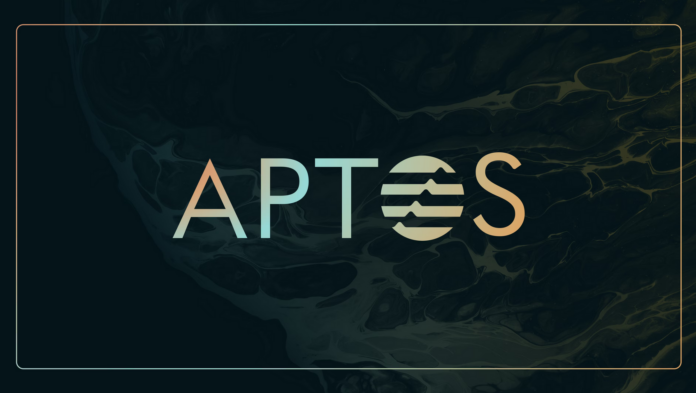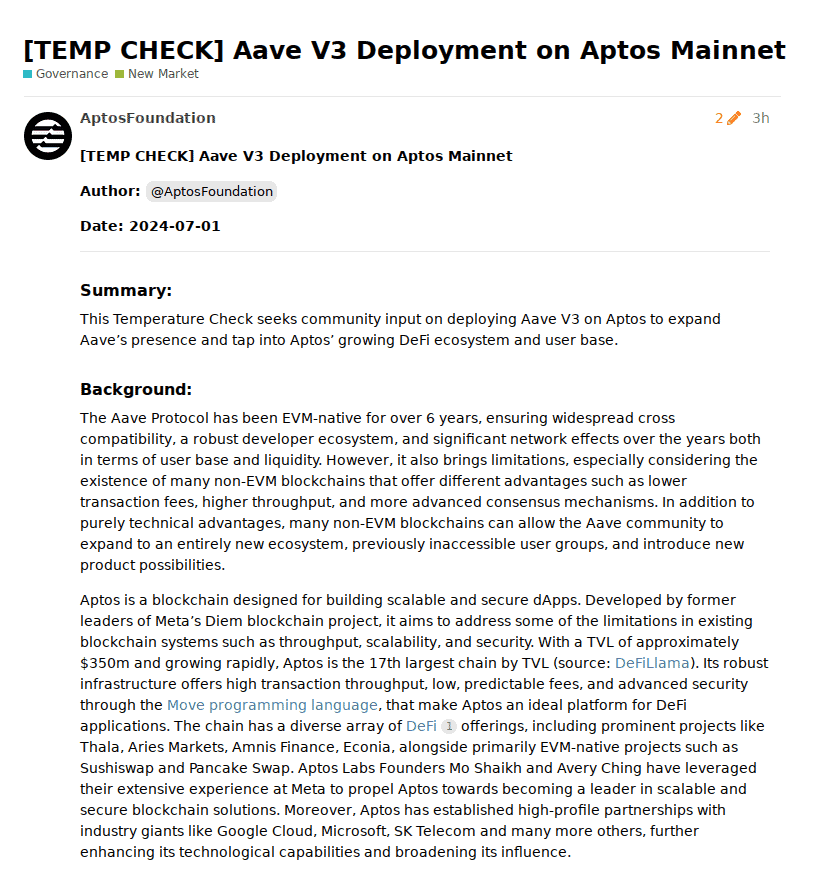
The Aptos Foundation has launched a proposal that could be a game-changer in the DeFi ecosystem: the implementation of the renowned AAVE V3 liquidity protocol on its own blockchain.
The Aptos Foundation, the organizational members in Aptos, the blockchain developer in charge of developing the Aptos blockchain, has recently proposed deploying a version of the well-known market generator, AAVE V3, on the Aptos mainnet. The proposal is currently in the development phase. «temperature check», gathering feedback from the AAVE governance community before moving forward. If the proposal is accepted and the deployment is carried out, Aptos developers would be able to natively access the open liquidity protocol governed by the AAVE DAO. Recall that Aave Labs, the project manager for AAVE, has already built the integration code and deployed it on the Aptos testnet, with the Aptos Foundation sponsoring the current audit process.
If the initiative is finally approved by the AAVE community, it would be the first implementation of AAVE on a non-EVM blockchain, making it accessible to developers in the ecosystem based on Aptos’ Move programming language. Move was originally developed on Meta by a team comprised of people from Facebook’s now-defunct Diem stablecoin project.
Good news for Aptos and AAVE users
The implementation of AAVE V3 on the Aptos network would have a significant impact on users of both platforms. First, Aptos users would have access to an industry-leading decentralized lending protocol, allowing them to borrow crypto assets and earn interest on their deposits. Meanwhile, AAVE users would have access to a new blockchain network, which would increase the protocol’s liquidity and transaction volume.

Furthermore, the implementation of AAVE V3 on Aptos could attract new developers and users to the Aptos platform, which would increase the adoption and usage of the network. Aptos developers would also gain access to new decentralized financial tools and services, allowing them to build new applications and services on the platform.
On the other hand, the implementation of AAVE V3 on the Aptos network could have a significant impact on the value of both cryptocurrencies. The price of Aptos could increase due to increased adoption and usage of the network, as well as the attraction of new developers and users. The price of AAVE could also increase due to the increased liquidity and transaction volume of the protocol, as well as exposure to a new user base on the Aptos network.
However, it is important to note that the impact on the price of both cryptocurrencies will depend on several factors, including the actual adoption and use of the AAVE V3 implementation on Aptos, as well as developments and news in the broader cryptocurrency market.
Aptos Foundation: Extending the Aptos Legacy
On the other hand, the implementation of AAVE V3 on the Aptos network would have several benefits for both projects. For Aptos, the implementation would attract new developers and users to the platform, increasing adoption and usage of the network. It would also provide Aptos developers with access to new decentralized financial tools and services, allowing them to build new applications and services on the platform.
For AAVE, the implementation would increase the protocol’s liquidity and transaction volume, potentially leading to increased adoption and usage of the protocol across the cryptocurrency industry. It would also expose AAVE to a new user base on the Aptos network, potentially further increasing adoption and employment of the protocol.
Whatever the case, the Aptos Foundation’s proposal to implement AAVE V3 on its network is an important step towards interoperability and expansion of the DeFi ecosystem. The integration of AAVE V3 into Aptos could benefit both projects, attracting more users and developers, increasing liquidity and participation in the protocol, and improving the utility and value of both cryptocurrencies. If the proposal is approved by the AAVE governance community, it could mark a milestone in the development of the DeFi ecosystem, opening up new possibilities for innovation and collaboration between different blockchains.



